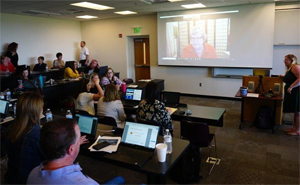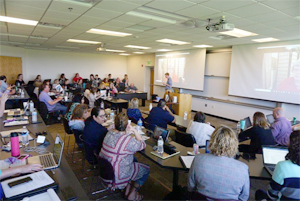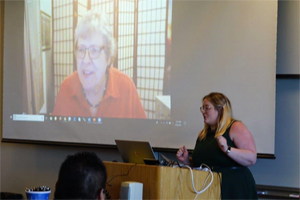
by Ann M. Koenig of the AACRAO International staff
When you want to learn more about academic credential fraud, who you gonna call? AACRAO International fraud busters! That’s what our AACRAO colleagues in North Dakota did when planning their 2019 summer NDACRAO meeting in early June.
Finding the fraud busters
Dr. Melissa McDowall, Registrar and Assistant Professor at the University of Mary in Bismarck and host of the NDACRAO meeting, had suggested the topic of fraud for a session in the group’s semi-annual statewide meeting. McDowall searched in
several directions before contacting AACRAO International through aacrao.org. AACRAO International
includes a module on academic document fraud in its international credential evaluation training programs.
McDowall was pleased with the result of her contact. AACRAO International staff member Ann Koenig worked with her to develop a two-hour session aimed at helping colleagues become more aware of fraud in the registrar’s and admissions offices and
defining professional best practices related to fraud.
A universal problem
As a universal problem, fraud is found in both the domestic and international admissions environments, as well as in other areas of the institution. Koenig covered the basics of fraud awareness, types of fraud, principles of best practice in setting appropriate
documentation requirements and reviewing documents, fraud detection, and the document verification process. She shared a myriad of resources on fraud available from AACRAO publications, many of which she herself has authored or contributed to. NDACRAO colleagues had the opportunity for some hands-on document detective work of their own, using sample cases that Koenig integrated into the session.
Document, document, document
When fraud has been confirmed, a common question is “What happens now?” Koenig emphasized the importance of documenting policies and procedures related to fraud. She gave some guidance on how to identify whether appropriate policies may
already be in place and shared considerations for developing policies if none exist. Ann also challenged the group to form “fraud watch” groups or task forces in their offices, on their campuses, and even within the NDACRAO network.
At the end of the session, McDowall suggested to the group that they discuss that idea at their business meeting the next day, and she reported later that NDACRAO is “planning to implement a state-wide ‘fraud log’ for all ND schools
to access and participate in, allowing us to document attempted fraud, and also give our neighboring institutions a heads up in the process. We hope to begin planning for that over the coming academic year.”
Fraud-busting from afar
One of the challenges for the NDACRAO group was the expense of bringing in an outside expert. With a small budget and a location that makes travel relatively expensive, McDowall was happy to learn that AACRAO International could provide an expert
trainer remotely. Using the Zoom meeting platform, Koenig could “be” in Bismarck while sitting at her desk in her home office in the Phoenix area.
“We assembled the members in a lecture room and used our classroom technology to allow Ann to both see and hear us, and us her, as she presented," McDowall explained. "With the use of a moderator to run the in-classroom camera and field questions
back and forth, the training session was able to be very interactive.”
McDowall’s summary expresses the importance of fraud awareness and learning the best practices and strategies employed by serious fraud busters like Koenig and the AACRAO International staff: “The content itself was excellent—regardless
of how much experience any one attendee had, there was a lot to learn. I would absolutely recommend that all those who handle intake and verification of educational documents make an effort to receive similar training on identifying and responding
to fraud. There is more to think about than we often realize.”
See below for information on Koenig's upcoming free webinar on Evaluating International Professional Degrees.

“Academic Document Fraud” Training Session presented by Ann Koenig, AACRAO International, for the NDACRAO 2019 Summer Meeting, June 5, 2019

Dr. Melissa McDowall, Registrar and Assistant Professor at the University of Mary, Bismarck, ND, host of the NDACRAO 2019 Summer Meeting, June 5, 2019, and moderator of the “Academic Document Fraud” Training Session; Ann Koenig, AACRAO
International, on-screen presenter